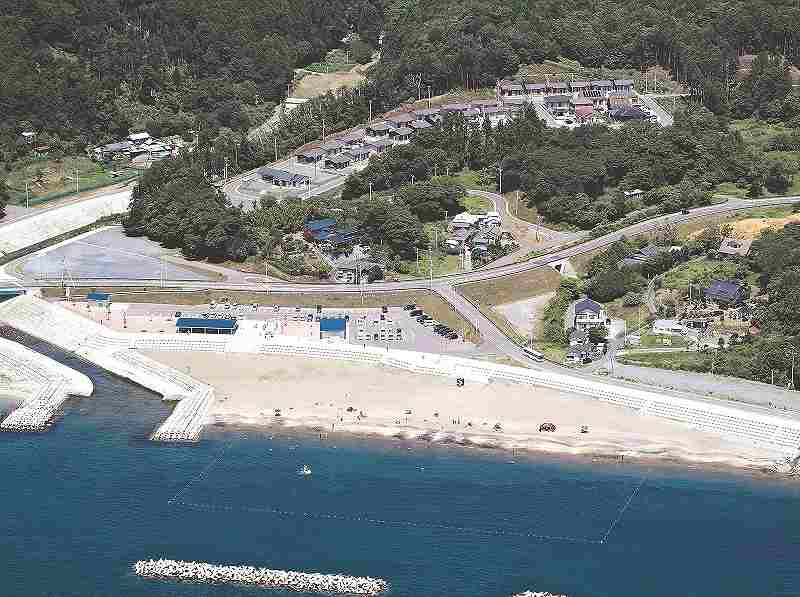
Kugunari Beach in Ishinomaki, Miyagi Prefecture, is seen on July 24. The beach reopened this summer after 12 years.
11:27 JST, August 13, 2022
Almost two-thirds of beaches in three prefectures hit hard by the 2011 Great East Japan Earthquake have opened to swimmers this summer, a record-high proportion since the disaster and another sign of recovery in the region.
Sixty-one swimming beaches dotted the coastlines of Iwate, Miyagi and Fukushima prefectures before the disaster. According to a Yomiuri Shimbun survey, 39 of these beaches, or 64%, have opened this summer, including six that welcomed swimmers for the first time in 12 years.
Locals are hoping, as the reconstruction of disaster-hit areas progresses, that opening more beaches and easing restrictions imposed to combat the novel coronavirus will breathe life back into the region.
According to the prefectural and local governments, Iwate had 23 swimming beaches along the Pacific coast in 2010, Miyagi had 20 and Fukushima had 18. Almost all these beaches were closed in 2011 due to damage caused by the tsunami and land subsidence, and the impact of the nuclear accident in Fukushima Prefecture in March that year.
These beaches gradually reopened over the following years, numbering 29 by 2019, including some beaches that partly reopened. However, the arrival of the coronavirus crisis in 2020 resulted in only 10 beaches opening that summer. In 2022, 39 beaches — 17 in Iwate, 14 in Miyagi and eight in Fukushima — allowed swimmers to hit the water.
Last month, Oisehama beach in Kesennuma, Miyagi Prefecture, opened to swimmers for the first time since 2010. The damaged seawall and sandy shore have been restored, but the opening was delayed for two years due to the pandemic.
Oisehama beach was known for its gentle waves and attracted about 30,000 visitors each summer before the 2011 disaster.
Junichi Fujita, who once operated a beach shop established by his father, remembers days when the beach was crowded with families. Fujita now runs a seafood processing business. After the tsunami swept away his home and factory, he restarted business in a temporary shop in 2012 and had rebuilt his store by August 2017. But Fujita’s heart ached whenever he saw the deserted beach.
“It felt like only Oisehama had been left behind,” said Fujita, 44.
But this year, the beach’s long-awaited reopening finally arrived. Although Fujita does not plan to reopen the beach shop, because doing so would not turn a profit, he intends to take part in events and other activities that will inject life back into the area. “We locals want to showcase the charms of this beach,” Fujita said.
In Fukushima Prefecture, reconstruction work at the Iwasawa swimming beach in the town of Naraha has been completed, allowing the beach to open for the first time in 12 years. In a move aimed at bringing some excitement back to the beach, a group of local surfers will in October restart a surfing contest that had been held there annually.
Kentaro Yoshida, a 36-year-old from the town of Hirono in the prefecture, started catching waves off Iwasawa beach when he was in junior high school.
“I want people to know this is a safe beach and to see how wonderful this place is,” Yoshida said.
Despite these positive developments, 17 swimming beaches in the three prefectures remain closed, including in the Fukushima Prefecture towns of Futaba and Okuma, which include what authorities classify as “difficult-to-return” zones for residents who had to evacuate.
Five beaches in the city of Iwaki in the prefecture have permanently closed due to the severe population decline in certain districts.
Yoshihama beach in Ofunato, Iwate Prefecture, reopened to swimmers for the summer of 2018, but was unable to do so in 2019 because of reasons including the increasingly elderly age of the residents tasked with monitoring the shore. The beach has since remained closed due to damage caused by a typhoon, the pandemic and this year’s discovery of debris from the 2011 disaster in the swimming area.
“We can’t say for certain when the beach will reopen, but we hope that will happen at some stage,” an Ofunato city government official said.
Top Articles in Society
-

Producer Behind Pop Group XG Arrested for Cocaine Possession
-

Man Infected with Measles Reportedly Dined at Restaurant in Tokyo Station
-

Man Infected with Measles May Have Come in Contact with Many People in Tokyo, Went to Store, Restaurant Around When Symptoms Emerged
-

Woman with Measles Visited Hospital in Tokyo Multiple Times Before Being Diagnosed with Disease
-

Australian Woman Dies After Mishap on Ski Lift in Nagano Prefecture
JN ACCESS RANKING
-

Producer Behind Pop Group XG Arrested for Cocaine Possession
-

Japan PM Takaichi’s Cabinet Resigns en Masse
-

Man Infected with Measles Reportedly Dined at Restaurant in Tokyo Station
-

Israeli Ambassador to Japan Speaks about Japan’s Role in the Reconstruction of Gaza
-

Videos Plagiarized, Reposted with False Subtitles Claiming ‘Ryukyu Belongs to China’; Anti-China False Information Also Posted in Japan





















